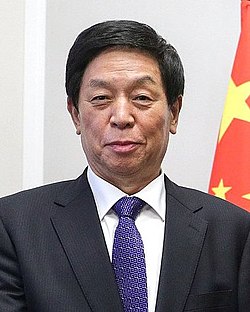Li Zhanshu [a] (born 30 August 1951) is a Chinese retired politician,who was the chairman of the Standing Committee of the National People's Congress from 2018 to 2023. He was the third-ranking member of the Politburo Standing Committee of the Chinese Communist Party,China's top decision-making body,between 2017 and 2022.
Contents
- Early life and education
- Regional leadership
- Hebei
- Shaanxi
- Heilongjiang
- Guizhou
- General Office
- Standing Committee
- Personal life
- Li Qianxin
- Li Duoxi
- Awards and honors
- Notes
- References
Born in Pingshan,Hebei,Li began his political career in rural regions of his native Hebei province,becoming the Party Secretary of Wuji County,Commissioner of Shijiazhuang in 1985,head of Chengde Prefecture in 1990,and secretary-general of the Hebei Provincial Party Committee from 1993 and 1997. He rose through the ranks becoming the Party Secretary of Xi'an in 2002,where he served until 2003. In 2008,he became the Governor of Heilongjiang,where he served until 2010. In that year,he became the Party Secretary of Guizhou province,where he served until 2012.
In 2012,he became director of the General Office of the Chinese Communist Party. After the 18th Party Congress in 2012,Li became a member of the CCP Politburo and one of the top advisors to party General Secretary Xi Jinping. In 2017,he became a member of the Politburo Standing Committee,being appointed as the chairman of the Standing Committee of the National People's Congress in 2018. He stepped down from the Politburo Standing Committee in 2022,and as NPCSC chair in 2023. He is regarded by the media as a senior member of the "Xi Jinping faction",one of the main political factions within the Chinese Communist Party. [1]
